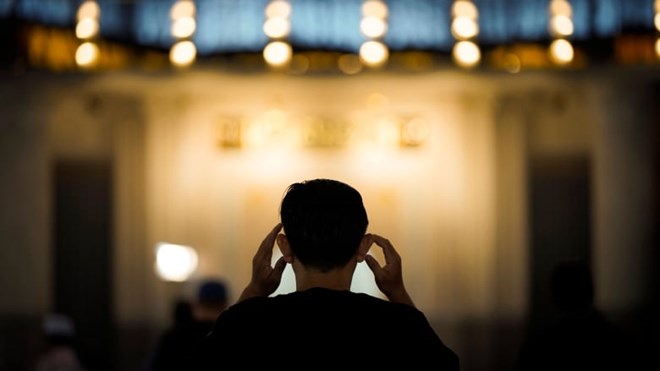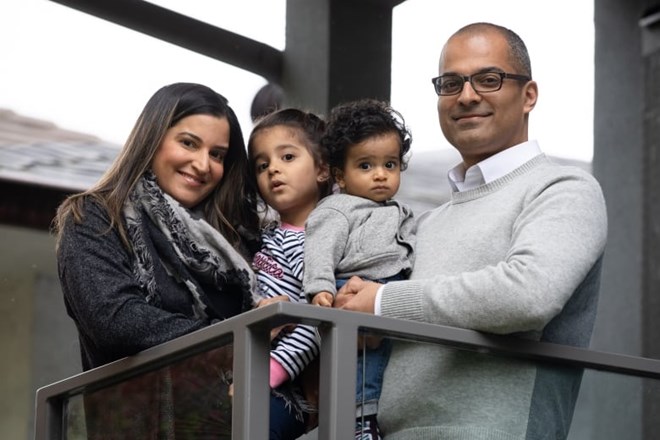
Friday April 24, 2020
By Shanifa Nasser
Absent congregational prayer and gatherings, the next 30 days will be unlike what most Muslims have ever seen

With countries around the world racing to curb the spread of the pandemic by restricting physical gatherings, much of what is central to Ramadan will be next to impossible. (Vincent Thian/Associated Press)
Forty-five minutes before sunset, Akber Ali and his family will settle in front of their computer screen hoping to recreate the warm, tingling feeling they would have surrounded by thousands of fellow worshippers at the mosque during the nightly prayers during the Muslim holy month.
But this will be no ordinary Ramadan.
"Everyone will look back and remember the 'COVID-19 Ramadan' or the 'Quarantine Ramadan,'" he says with a nervous laugh, knowing the next 30 days will be unlike what virtually any of the world's 1.8 billion Muslims have ever seen.
During the holy month, Muslims across the globe observe a period of daily fasting from dawn until dusk, placing special attention on prayer, internal reflection and charitable acts. In homes around the world, families and friends gather to reflect, break their fasts and celebrate with a shared meal known as an iftar. At the mosque, iftars can be attended by hundreds or thousands, with community members coming together to donate, cook and feed loved ones after a long days' fast.
But with countries around the world racing to curb the spread of the pandemic by restricting physical gatherings, much of what is central to Ramadan will be next to impossible.
And being apart will be a test of faith, says Umair Ahmed Khan, an imam in Delta, B.C.
"This pandemic is actually giving Muslims an opportunity now to practise that self-discipline," he said.
'Spiritual boost'
With the new moon, and the start of Ramadan, approaching, Ali set about organizing a virtual nightly fast-breaking speaker series featuring prominent Muslim scholars and figures from across Canada — an attempt to bring the atmosphere of congregation into people's homes with the help of technology. Just before the sun sets, the call to prayer will be recited, marking the end of the event, after which families will break their fasts, often with dates and water, before performing the evening prayer.
"This is a human problem. It doesn't know any race or religion."
- Imam Sayyid Rizvi
"We want to be able to give people that spiritual boost for the night at home," said Ali, who is director of community outreach at the Islamic charity group Penny Appeal Canada in Toronto.
Amid the pandemic, the group has donated over 4,000 relief kits to families across Canada, regardless of religion or race, struck up a drive to collect personal protective gear for local shelters and health centres, and is hoping to raise money to support small- and medium-sized mosques that have been facing financial hardship as their congregations disappear, practically overnight.
"Ramadan is a spiritual month for Muslims," he said. "It's a month for many different things, first and foremost, strengthening your connection with your creator. And then secondly, Islam teaches us, and all the major religions teach us, to take care of your neighbours."

Yashina Jiwa, left, and Rizwan Mawani hold their children Nureya and Zayan on their front porch in Vancouver. Yashina and Rizwan said Ramadan will be different. (Maggie MacPherson/CBC)
The online fast-breaking initiative isn't the only one of its kind. Canada's Ahmadiyya Muslim community has launched its own event, billed as "an interactive and creative way" to learn about the fast and come together at a time when physical distancing demands separation.
At the Jaffari Community Centre in Toronto, Imam Sayyid Rizvi says the pandemic is bringing into relief just how essential a part of Ramadan giving is. Rizvi's mosque recently donated $25,000 worth of personal protective equipment to a local hospital and plans to ramp up fundraising for more during Ramadan.
"This is a human problem. It doesn't know any race or religion," said Rizvi, who will also be hosting virtual seminars with other imams from the community.
'Common humanity'
"It has forced us to come together as humanity at large to work as one. And we hope that feeling, realizing that we are one human race … that spirit and co-operation between nations and people from different parts of the world, we hope it prevails."
Right now, that shared spirit is perhaps nowhere felt most in Canada than in Nova Scotia, where the families of at least 22 people are grieving after a devastating mass shooting that left the province in shock.
Imam Abdallah Yousri with the Ummah Mosque and Community Centre talks about how his community is reacting to the Nova Scotia shooting, and how COVID-19 has changed Ramadan this year. 8:01
Halifax Imam Abdallah Yousri would normally have been preparing for an interfaith gathering to bring Nova Scotians together to honour those lost. Instead, he'll be one of several faith leaders creating an online video message of support for the community.
"We always say that we can worship God under all circumstances. And during these tough times, we need to show this to show solidarity with everyone and support each other and care for one another especially during this time we are experiencing right now," he said.
It's lessons like that Rizwan Mawani and Yashina Jiwa of Vancouver hope to teach their little ones, three-year-old Nureya and seven-month-old Zayan — even if they can't go to their jamatkhana, a place of worship, for prayers this Ramadan.
"Fasting has many levels," said Mawani.
"There's the abstinence of food and drink during the hours of sunrise and sunset… But there's so much more and that's in some ways the harder fast: making sure you're kind to everybody else, looking after those who are more vulnerable than you.
"It reminds us of our common humanity."